Dawn Fraser talks swimming, life and reveals her true feelings on Dan Andrews axing Comm Games
At 86, Olympic icon Dawn Fraser is still not slowing down. Here she discusses her first sporting love, her namesake award and why Dan Andrews axing the Commonwealth Games was “disgusting”.

Fiona Byrne
Don't miss out on the headlines from Fiona Byrne. Followed categories will be added to My News.
Australian and Olympic icon Dawn Fraser is celebrating other greats of Australian sport.
Fraser, 86, remains a mentor of young athletes, a confidant of competitors of various endeavours and a fierce and loud cheerleader of women’s sport.
She became a member of the Sport Australia Hall of Fame in 1985 and was elevated to Legend status in 1993. In 1998 was included as one of Australia’s National Living Treasures and in 1999 she was named World Athlete of the Century at the World Sport Awards. Fraser’s incredible swimming career included eight Olympic medals, six British Empire and Commonwealth gold medals and she set 23 individual world records. She won the 100m freestyle at the 1956, 1960 and 1964 Olympic Games and was the first woman to break the minute for the 100m freestyle. She was named Australian of the Year in 1964. Fraser’s legacy of sporting excellence lives on in The Dawn Award which was established by the Sport Australia Hall of Fame in 2021. I caught up with Fraser during Melbourne Cup Week to talk about her first sporting love, hint: it was not swimming, the Matildas, Hollywood stars, her namesake award, Dan Andrews, and exactly how many Olympic flags she has had a hand in “souveniring.” Fraser will be in Melbourne next month for The Dawn Award.
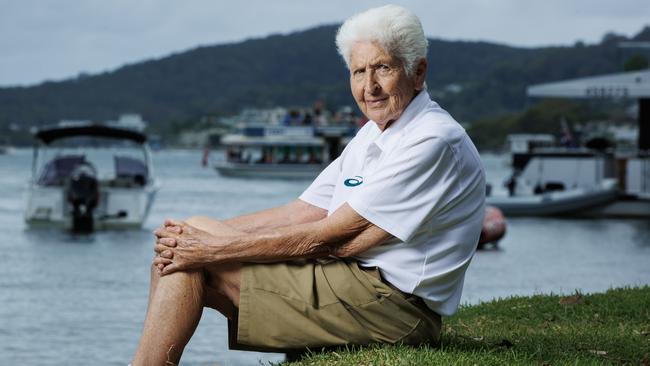
Fiona: Dawn, were you born with a will to win?
Dawn: I am very competitive. That comes with being the youngest of eight in the family and having two brothers older than you. You have to play around with them all the time so, yes, I was very competitive from a very early age. I played basketball. I played Rugby League with my brothers. We were always competing with and trying to beat each other when I was younger and that formulated my life.
FB: Was swimming your first sporting love?
DF: My first love was riding horses, but my family could not afford me to ride so we used to look after the council horses each weekend. We would pick them up on a Friday afternoon at the stables at the council yard and take them up to the national park at Lane Cove (Fraser grew up in Sydney). My brothers and I used to camp up there on the weekend, look after them, swim them and then bring them back on Sunday afternoon, put them in their stalls and Monday morning they were ready to go. In my day everything was delivered by horse and cart — dirt trucks and dunny trucks and food and vegetables and things like that — and we needed very fit, fresh horses.


FB: That love of horses never left you.
DF: I went to Adelaide to live (around 1955) with Mr Gallagher (her coach Henry Gallagher) and trained down there for seven years. Colin Hayes and the jockeys Billy Pyers and Jimmy Johnson used to come into the sauna bath at the pool. One day I was having a massage and one of the jockeys came and hit me on the backside and said “come on Dawnie, get up, it is my turn” and that is how I came to meet the jockeys. Colin came in one day to see Billy and I said ‘hello Colin Hayes, do you want some help riding your horses in water work Sunday morning’s after the races?’
He said “we don’t do that”, but said to come down next Sunday, so Billy Pyers and I drove down and we had a lot of fun riding the horses down to Port Adelaide and swimming them in the water and those horses, the next day, were jumping out of their skin.
We ended up having 10 horses every Sunday morning that we swam.

FB: Was it a job or a pastime?
DF: Colin paid me 20 quid a Sunday, which was a lot of money in those days. He did not give me the money, he put it in a banking account for me and when he had a horse that he thought was going to run well he would back it, put my wages on it, and then put the money and the winnings back into the account. When I left Adelaide to move to Melbourne with Mr Gallagher I had 9000 pounds in my bank account.
I used to love riding and I used to jump horses when I lived in Adelaide and I got my first pair of riding boots made by Reggie Williams (R.M Williams). He did not charge me a thing, he gave them to me as a present.
FB: Your first Olympics was Melbourne in 1956 where you won the 100m freestyle.
DF: It was a walk into the unknown because I had not swum against international swimmers ever. It was my first international competition, so the only two swimmers I was worried about were (fellow Australians) Lorraine Crapp and Faith Leech. They were always on my tail or I was on their tail. We finished one, two, three.
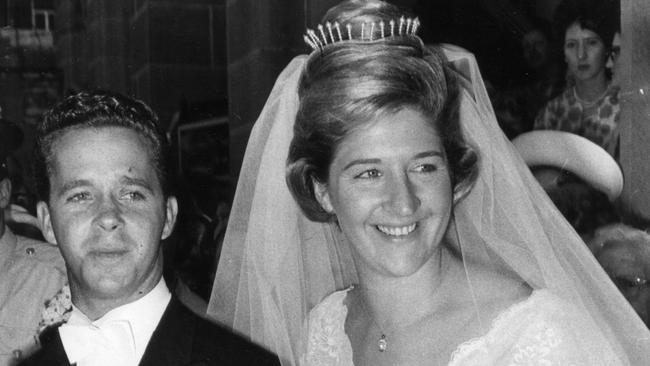
FB: Were you feeling any pressure as the defending champion in 100m freestyle at the Rome Olympics in 1960?
DF: No, I did not change my train of thought. I had a lane to swim in and I had to get up there and back and be the first to do that, and that is the way I always swam. My coach taught me never to worry about my competitors, just to worry about myself and to worry about my swim, make sure I breathed where I had to breathe and that I did not take a breath where I did not need to, stuff like that. I just improved all the time on that.
FB: You won the 100m freestyle title at the 1964 Tokyo Olympics, but it was a struggle for you to make it to the games.
DF: I did it (swam) for my mum. There had been a car accident (in Sydney in early 1964) and she died and I was the driver of the car. I fractured my neck in the crash; breaks in (vertebra) C5, 6 and 7. Getting over a broken neck was very hard to adjust to and mum just kept on talking to me all the time. That is what I believed as I stood up on the block. I had her wedding ring and engagement ring on my finger and I just said ‘this is for you mum’.
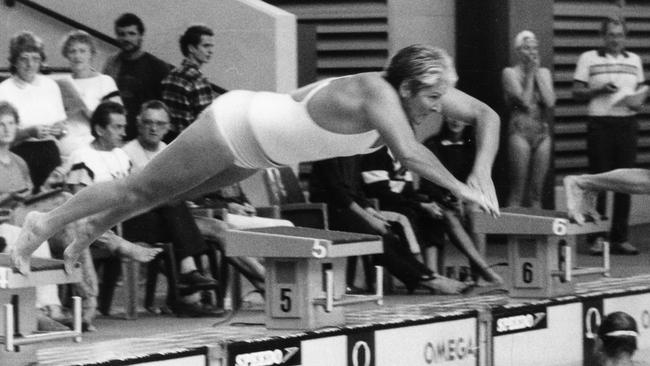
FB: How did you train with the injury?
DF: I could not dive into the water. The only time I dived in was at the Olympic Games. I did not dive in at trials. I asked if I could push off and that is what made my turn very good because I got very strong in my legs from doing the push off. My doctor said I could not dive in for six months, but that was going to be after the Olympic Games so I thought, ‘well I have to do neck exercises and get the muscles in my neck strong enough again to hold my neck when I dive in.’ I had to change my diving method, I had my head within my arms and my arms took the force of the water. Everything had to change, but it changed for the good. Self motivation is very important for an athlete and I try to install that into all of my athletes who I talk to. It is surprising how people achieve it.
FB: 1964 is also when you famously got caught with an Olympic flag.
DF: Yes. I was doing a film and I was away from the team at the time and the hockey players won bronze and my producer said ‘would you like to invite the boys back to the hotel for a drink?’ I was staying at The Imperial Hotel in Tokyo outside of the village. I rang the (team) doc and he brought a few boys in for a drink to congratulate them. It was a fun night and we were all finished with our competitions. The doc said ‘hey Frase, do you want a flag?’ I said ‘you know I have always wanted a flag, Doc’. and he said ‘there are some up the road, let’s go and get one’. And we did, we got one. I did not climb the flagpole. We put the hockey player up there, he was light.
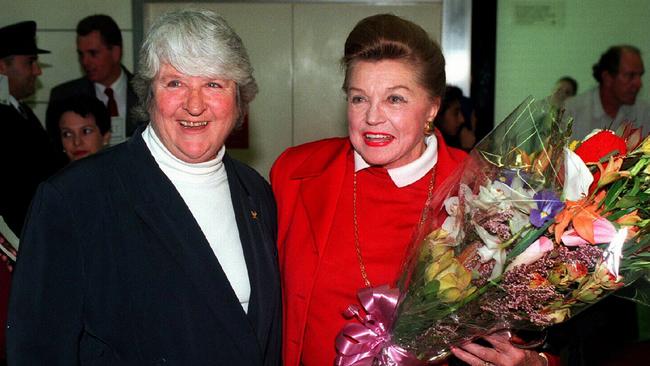
FB: Then things got interesting.
DF: I had the flag underneath my shirt. The police saw us and started whistling and I ran away from the guys and ran into the pub. They got caught. I was sitting and waiting and the next minute I had two policemen put their hands on my shoulder and say ‘what are you doing here?’ and I said ‘I am waiting for some friends’.
They said ‘not a good place to wait, come with us’ and as I got up the flag rope fell out of my shirt and they took me to the police station.

FB: You weren’t charged and somehow ended up with the flag.
DF: The police came into my hotel the next morning and the detective sergeant walked in with six other officers and a big box of flowers. Under the flowers were the Olympic flag and a letter from the Emperor that read ‘Please accept this gift from the Tokyo Olympic Games, (signed) the Emperor of Japan.’
FB: I hear that is not the only Olympic flag you have had a hand in souveniring.
DF: There was another one, in Rome in 1960. I did not get it. One of the water polo guys got it. I was going out with a water polo boy, Keith Whitehead, at the time and I had finished swimming and I think they had just finished their games and we were going out for dinner and he said ‘let’s go and get a flag’ and I said ‘OK, fine.’ He got the flag.
Many, many years ago an Australian cyclist souvenired a flag. I can still remember the flag being draped over his coffin when I went to his funeral. There are a lot of flags in Australia that have been souvenired at Olympic Games, believe me.
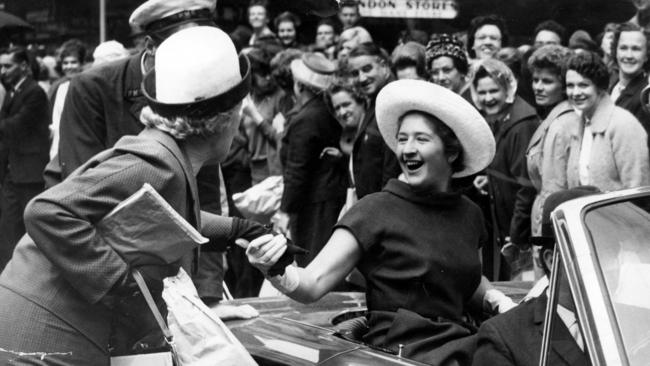
FB: Who did you admire as athletes?
DF: Muhammad Ali, who I met on a number of occasions, Cathy Freeman, Freddy Lane, Fanny Durack and I was very impressed with Esther Williams (Hollywood star and US national swimming champion). She was one of my idols. I met her when I went to America in 1957 and when I finished swimming Kerry Packer and John Singleton had a luncheon for me and I invited Esther and her boyfriend, Bill, out (from America) to be my guests.
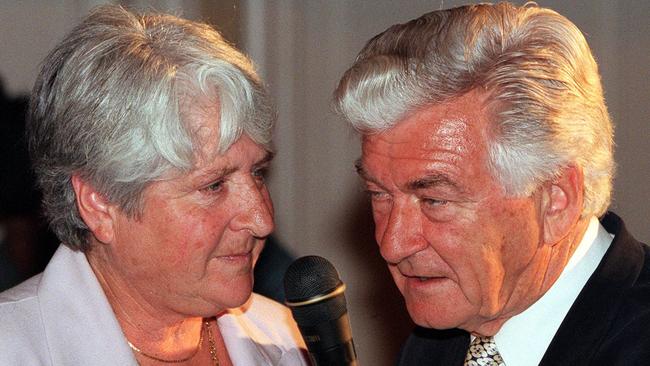
FB: Kerry Packer must have thought you were the bees knees.
DF: He did a lot for me, a lot to help me. I was never to say anything when he was alive, but he gave me the opportunity to swim (train) in the winter time when I went home to Sydney (when she was still swimming competitively). We had no indoor swimming pools at the time, all our pools were outdoors, and Kerry had a 20m indoor pool at the bottom of his office at the corner of Elizabeth Street and Park Street. Monday to Friday I swam there. He used to have a swim every day.
FB: Do you still swim?
DF: I do occasionally, but I have to wait another week until I can get back in the water. I have had a knee replacement.
FB: Are you planning to slow down any time soon?
DF: At 86 years of age I have to sit back a little bit and not try to do everything I was doing before. I have to think about slowing down. I am still mentoring some athletes and swimmers and disabled swimmers. This is my last year, I think. I think I might be getting a little bit too old for the younger kids.

FB: What did you make of Victoria cancelling its contract to host the 2026 Commonwealth Games?
DF: I thought what Dan Andrews did in pulling the pin on the Commonwealth Games was absolutely disgusting. He should never have done it. They spent too much money outside of getting the games organised and he said they were going to be too expensive to run. He should not have bid for it in the first place if there was not a solid plan in place that could successfully deliver the games. He has put a block in front of a lot of the young junior athletes who were trying out for the Commonwealth Games. It is damaging to a whole generation from a whole range of sports. I don’t know how he is sleeping at night, to be very honest, with what he has done to Victoria.
FB: It has been an extraordinary year for women’s sport. Is it getting the recognition it deserves?
DF: We are not there yet, but we are getting it. There is still a little bit to go. Having now the Matildas, the Rugby Sevens, and the AFLW, they are starting to get the acknowledgment that they should get and they are setting the pathway for all the young generation of male and female athletes to do good.
I thought the Matildas were absolutely fantastic. They are deservedly being acknowledged and they are a force to be reckoned with.
I have fought all my life to make sure that females do get the acknowledgment that they need and deserve. If you have a look at our Olympic Games history in Australia the majority of medals that have been won have been by women.
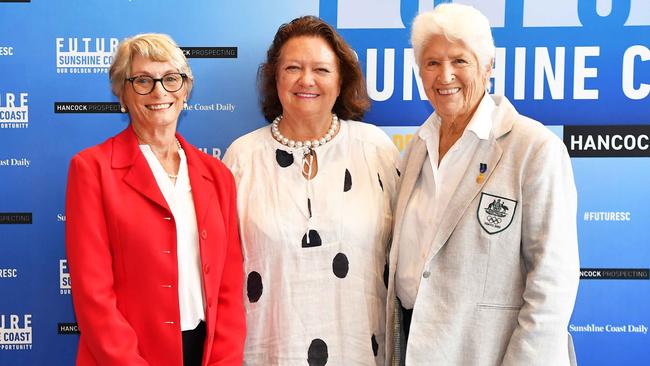
FB: What was it like to be asked if you would put your name to the Sport Australia Hall of Fame’s Dawn Award?
DF: I was flabbergasted actually, to be very honest, because it is a great honour to have an award named after you in the Sport Australia Hall of Fame. I said to John Bertrand when he called, ‘I will have to call you back because I can’t talk to you’. It was half an hour later that I rang him back and said ‘why are you doing this?’ He said ‘well, we have The Don Award and we want The Dawn Award,’ so I said ‘thank you very much’. I find it a great honour.
The award goes to an individual or a team that has shown courage, been pathfinders or groundbreakers, and have changed sport for the better.
The first recipient was Evonne Goolagong Cawley and last year the award went to Peter Norman. I’m looking forward to presenting the award for the third time here in Melbourne in a couple of weeks.
The winners of The Dawn and The Don awards will be announced by the Sport Australia Hall Of Fame on December 1, 2023.



